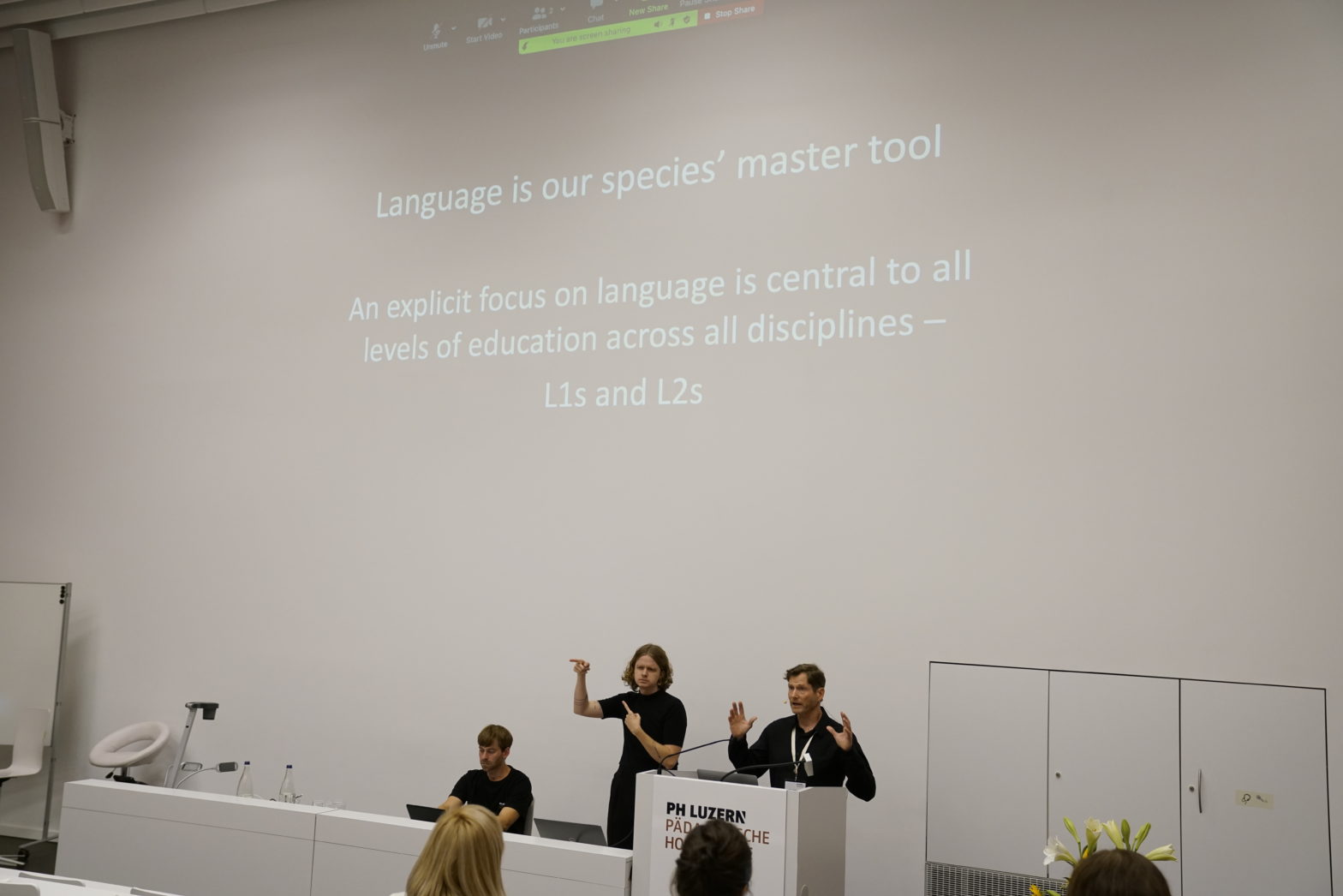The digital transformation of the early 21st century not only allows for new ways and resources for language education but also comes with shifting relations of power, control, and ownership. The conference held at the PH Luzern addressed such dynamics and their impact on learning and teaching languages.
The international conference «Language Learning and Teaching in Digital Transformation» that was held on September 1-2, 2023, in Lucerne (Switzerland) responded to the need to rethink language learning and teaching in the digital era and to integrate transdisciplinary perspectives on language education. The conference was held in English and in International Sign Language and brought together scholars, teachers and teacher trainers as well as students from different disciplines and parts of the world to discuss diverse approaches to language learning and teaching.
Trajectories for language education in digital transformation
All five conference keynote speakers illustrated promising perspectives on how learners and digitalisation interact in the language learning context. Steve L. Thorne’s talk entitled «Language is our species’ master tool: Rewilding language», for example, looked back to the beginning of mankind to explain that tools have always shaped the use of humans’ movement and actions and hence the use of language. Therefore, the scholar advocates using digital tools or online settings for rewilding language education based on the fact that language learners often exceed their performance in the digital wild, i.e., in engaging and meaningful settings, compared to what they usually achieve in the classroom. For us, educators, this means we should strive to dynamically augment formal learning settings by integrating the linguistically rich engagement occurring, for example, in online communities.
For us, educators, this means we should strive to dynamically augment formal learning settings by integrating the linguistically rich engagement occurring, for example, in online communities
Jannis Androutsopoulos, on the other hand, in his presentation «De- and recentering language teaching and learning in digital environments» draws our attention to shortcomings that arise when language learning occurs solely on social media. Although platforms like Instagram or TikTok mushroom and invite learners to engage for free; a critical analysis shows that they offer mostly simplified, often one-sided features of the target language that promote mindless reproduction as well as a re-centering native-speakerism view of language. Instead, in the 21st century a decentering view of language learning should prevail, one that promotes diversity and critical awareness of how and why languages are used.
The latter aspect was also a/the topic in Crispin Thurlow’s presentation called «The stuff of words». Simply put, the stuff and the words cannot be separated. Words and sense always co-signify and are mutually dependent in meaning-making. For language instruction this might mean that, for example, lexis needs to be introduced in an authentic context so that the meaning and use become explicit. Digitalisation can support educators to provide authenticitiy in the classroom.
Lexis needs to be introduced in an authentic context so that the meaning and use become explicit. Digitalisation can support educators to provide authenticitiy in the classroom.
Similarly, in her talk «Critical digital literacies and language education in challenging times: voices form the Global South», Cláudia Hilsdorf Rocha pointed out that education in a digital society needs to include discourse on multiliteracies, multilingualism, trans-culturalism and translingual practices to fight monolingual, sometimes even oppressive ideologies.
Lastly, Liona Paulus’ presentation on «Emergence of a scientific/academic register in non-written languages: in sign languages» demonstrated that thanks to digital transformation also deaf students and scholars can now produce and publish academic work in their first language, in sign language, by submitting it in a video format with clear regulations according to APA.

Conclusion: Yes to digital transformation, but…
The perspectives presented above do offer promising opportunities for more equal education, enhanced participation, and meaningful content. In short, they provide a sense of empowerment for learners and teachers alike. However, one needs to be aware that digitalization also raises questions of fair accessibility, of sustainability (cf. digital pollution) and of surveillance. Moreover, digitalization does not lead to better learning per se – the need for careful selection and purposeful implementation of learning environments also applies to the digital transformation of the 21st century.
However, one needs to be aware that digitalization also raises questions of fair accessibility, of sustainability and of surveillance. Moreover, digitalization does not lead to better learning per se.
About the author
Silvia Frank is a lecturer in English methodology and a researcher at the PH Luzern and a member of the organization committee of the conference “Language Learning and Teaching in Digital Transformation”
Photos by Simon Bürgler

